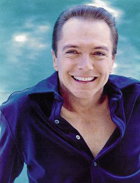
David Cassidy
Anguished teen idol who made his name on television as a member of The Partridge Family and had a string of hits in the Seventies
November 22, 2017
The Times
https://www.thetimes.co.uk/article/david-cassidy-kx795xxts

David Cassidy in 1971. At his peak he was the world’s highest-paid live entertainer
David Cassidy was playing in the Broadway production of Joseph and the Amazing Technicolor Dreamcoat when he first met a youthful billionaire named Donald Trump, who invited him to a party on his yacht. Many years later, when Trump was making his bid for the Republican presidential nomination, Cassidy recalled the occasion. “First thing when I stepped on his yacht, he said, ‘So, David, where’s the broads?’ And I went, ‘Oh, no.’ ”
The story perhaps reveals much about Trump, but also about Cassidy. It was 1983 and he had spent the previous dozen years as an androgynously good-looking pop star whose concerts provoked more hysteria from his youthful female audiences than had been heard since the heyday of the Beatles.

David Cassidy and Shirley Jones performing at an awards ceremony in Hollywood in 2003
If Trump was disappointed that Cassidy did not turn up with a posse of willing and nubile teenage fans in tow, he had misunderstood his guest. By then Cassidy had come to hate his pop past and was attempting to reinvent himself as a serious singer and actor.
His success as a teeny-bop heart-throb had been spectacular. At his peak in the Seventies, Cassidy was the world’s highest-paid live entertainer, earning $50,000 a night (about £225,000 today). His official fan club — 99 per cent of whom were teenage girls — had the largest membership in pop history, exceeding those of Elvis Presley and the “Fab Four”.
“I am grateful for it, because without them I might be pumping gas,” he once said — and yet he spent most of his adult life attempting to shake off his pin-up image. “I had no life. As a human being I was quite emotionally stunted. I never sought the fame and I was always trying to hide from it,” he insisted.
There seemed to be no escape. “I’m exploited by people who put me on the back of cereal boxes,” he complained at the height of his fame. “I asked my housekeeper to buy a cereal and when she came home there was a huge picture of me on the back. I can’t even eat breakfast without seeing my face.”
He was particularly popular in Britain, where between 1970 and 1975 he had five Top 20 hits with the Partridge Family and seven Top 20 solo hits, including the No 1s How Can I Be Sure and Daydreamer. In one week in 1973 there were six sell-out shows at Wembley Stadium and the word “Cassidymania” entered the language. Many years later Cassidy inspired the novel I Think I Love You by the British journalist Allison Pearson, a story of a teenage girl’s passion for the singer in the 1970s and her meeting many years later with the male employee who had faked the replies from the singer to his fan mail.

David Cassidy, arriving in London for a concert in 1974
Frustrated with his bubble-gum image, Cassidy gave an interview in 1972 to Rolling Stone in which he talked about his fondness for drink, drugs and sex and posed naked for Annie Leibovitz on the cover. The accompanying story, headlined “Naked Lunch Box”, did not, however, attract the more mature audience he craved.
Cassidymania turned sour in 1974 when more than 600 fans were injured during a stampede of teenage girls at a show at the White City Stadium in London. Thirty were taken to hospital and one, Bernadette Whelan, 14, died without regaining consciousness. The singer announced that the tragedy would “haunt” him until he died. He quit The Partridge Family, the TV show that had been the foundation of his success, gave up touring and tried to reinvent himself as a serious singer-songwriter.
He had one further big hit with I Write the Songs, although the song had been written by Bruce Johnston of the Beach Boys, which just entrenched the view that he was nothing more than a teeny-bop fake. He later claimed that he had received only $15,000 from the estimated $500 million made from merchandising during his heart-throb years after signing away most of the rights.
By the Eighties he was in the throes of another reinvention as he moved into musical theatre. His appearance in George M Cohan’s musical Little Johnny Jones was a disaster and negative reviews of his performance led to his replacement before the production reached Broadway. Even worse, the part went to Donny Osmond, his main rival for poster space on teenage bedroom walls during the Seventies.
Joseph and the Amazing Technicolor Dreamcoat
was better received. It led to him taking over from Cliff Richard in the West End production of Time and returning to Broadway in Blood Brothers alongside Petula Clark and his half-brother, Shaun Cassidy. There were long stints on stage in Las Vegas.His personal life was complex and he struggled to find domestic happiness. There were two failed marriages, first to the actress Kay Lenz, whom he wed in 1977 and divorced six years later, and then to the South African-born horse breeder Meryl Tanz. They had met in 1974 and married ten years later, but separated when he had a daughter with the model Sherry Williams Benedon. Their child, Katie Cassidy, who was born in 1986, became an actress. He married again in 1991 when the songwriter Sue Shifrin became his third wife. The couple had a son, Beau, who became a singer. Cassidy and Shifrin separated in 2013.
Over the years Cassidy had psychotherapy and struggled with drugs and alcohol, which, he admitted, he used to “numb” himself. “It became a struggle not to drink and it became a habit. I was sitting at home drinking wine on my own till 4am,” he said. He was arrested more than once for drink driving. Despite having sold 25 million records, he filed for bankruptcy in 2015. Two years later, after falling on stage, he announced that he was suffering from dementia and retired from performing.
He was born David Bruce Cassidy in 1950 into a showbusiness family in New York. His father was Jack Cassidy, a singer and actor, and his mother was Evelyn Ward, an actress. David was brought up by his maternal grandparents because his parents were constantly away in touring productions.

Performing in Las Vegas with Sheena Easton
When he was six he found out from a neighbour’s children that his parents had divorced two years earlier. The news only came out because his father had then married the actress Shirley Jones, who had just become a star in the film Oklahoma!.
He went to live with them in California and his relationship with Jones was loving. “She was a role model on how to deal with fame and success,” he said. “She’s one of the best human beings I’ve ever known. She was a great help to me in my difficult relationship with my dad and served as a great buffer.”
He admitted struggling to gain the approval of his father, whom he suggested became “tormented” when his son became more famous than him. “I loved him and admired him, but I just couldn’t find a way for it to be OK with him,” he said. “It was a rough one for us.”
When his father died in a fire at his Hollywood apartment in 1976, Cassidy had not spoken to him for nine months. His mother, who suffered from Alzheimer’s disease, died in 2012. “Seeing such a vibrant woman reduced to this is really just heartbreaking. It’s such a cruel and debilitating disease,” he said at the time.
He made his Broadway debut in 1969 in a musical, The Fig Leaves Are Falling, which closed after four performances, but then passed a screen test with Universal Studios and returned to Los Angeles. After small parts in the TV series Ironside, Marcus Welby, M.D. and Bonanza he was cast in the musical sitcom The Partridge Family as Keith, the eldest of five fictional children of a widowed mother, played by his real stepmother, Shirley Jones. The show was a huge success, as were the spin-off hit records credited to the Partridge Family, the first of which, I Think I Love You, topped the American singles chart in 1970.
The show also launched Cassidy’s solo career, but even at the height of his success he craved recognition as a “serious” rock musician. In interviews he created a persona who loved garage rock and the blues and cited Jimi Hendrix, the Doors and John Lennon as his heroes. He became friends with Lennon after the former Beatle moved to New York in the Seventies and claimed that David Bowie had once offered to produce an album of him singing songs written by Lou Reed.
In later years Cassidy continued to perform for a small fan base that had grown up with him. Thankfully, they had at least learnt to stop screaming, he noted. On TV he appeared in a “where are they now?” show and was reunited with Trump on the future president’s reality show Celebrity Apprentice. He was the first contestant to be ousted, but claimed that his rustication came as a huge relief. “When The Donald said, ‘Fired!’ I went, ‘Thank God!’ ”
David Cassidy, singer and actor, was born on April 12, 1950. He died of liver and kidney failure on November 22, 2017, aged 67
